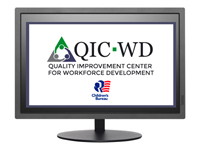Child Welfare Quality Improvement Center for Workforce Development (QIC-WD)
Date of this Version
1-2013
Document Type
Article
Abstract
Purpose The International Federation of Coaches (ICF) defines coaching as: “partnering with clients in a thought-provoking and creative process that inspires them to maximize their personal and professional potential.” “Coaching is highly focused on individuals designing their future – and that of their organization – and achieving excellence through setting personally and professionally challenging goals and committing to taking the actions necessary to achieve them” (Byrne, 2007). In the field of child welfare, coaching is being utilized in work situations, at all levels of the system, to focus on specific skills and abilities to reach specific outcomes, enhance performance and to develop deeper levels of critical thinking. The National Implementation Research Network includes coaching as one of its core implementation components (NIRN, 2008). The NIRN research cites several reasons why coaching is helpful for effective implementation: 1. Newly learned behavior is rudimentary compared to performance by a master practitioner, 2. Newly learned behavior is fragile and needs to be supported in the face of reactions from consumers and others 3. Newly learned behavior is underdeveloped and will need to be shaped to be most functional in a service setting. This curriculum was designed to orient participants to a coaching model, provide opportunities to practice coaching and to customize the coaching application to the unique needs of each respective child welfare system or local jurisdiction, targeting various levels within the organization. BACKGROUND: The Atlantic Coast Child Welfare Implementation Center (ACCWIC) is one of five Child Welfare Implementation Centers established by the Department of Health and Human Services (DHHS), Administration for Children and Families (ACF) and Children’s Bureau (CB). ACCWIC engages and supports public Child Welfare Agencies in federal regions III and IV providing coordinated, individualized, intensive technical assistance to implement strategies for improving the quality and effectiveness of services for children, youth, and families to achieve their Child Welfare Agency objectives. ACCWIC employs training/technical assistance methods based on available research; provides implementation knowledge to coach and facilitate successful individualized implementation projects; provides training and technical assistance to coach, mentor, and support the successful implementation of multi-year system change projects; and generates toolkits, develops resource manuals, and other products to document what works, under what conditions, and in what ways. Throughout the work in each of the project states, it became evident that incorporation of a coaching component was critical to supporting effective implementation as well as strengthening child welfare practice, developing competency, and developing leadership skills and capacity. While many child welfare systems indicate that they use a coaching model, there was little disseminated in the field on the skill set and application of coaching to support the development of sound practice. ACCWIC researched, developed, tested and refined this curriculum before making it available in this format to the larger child welfare community. Coaching Skills: Two Day Curriculum 2 | Coaching in Child Welfare | Two-Day Training Curriculum Time The curriculum takes 12 hours to deliver over two days, which includes two 15-minute breaks and a 45-minute lunch each day. Coaching Demonstrations The training features two coaching demonstrations, one on the morning of Day 1 and one on the morning of Day 2. These are live demos, not role plays or prescripted demonstrations. Tailoring this Training to Your State’s Needs: There are two parts of this training that are intended to address your state’s unique needs and intention in using coaching. The morning of day 1 includes a half hour on “Implementation of Coaching in our state”. We encourage you to use that full half hour to explain clearly to the trainees in the room what the purpose of coaching is, the roles of the coaches, how supervisors in the room can use the coach approach, why coaching is important in your implementation initiative – and to answer any questions trainees have about how they will be expected to use the training when they leave the room. The afternoon of day 2 (after the final practice coaching) is another block of time for you to address the group’s questions about how they will be using coaching, what their next steps are, how to talk about coaching with their coachees or their team members. Target Audience: Participants attending the training could be either child welfare professionals who would be serving in a coaching capacity or child welfare administrators who could benefit from a general understanding of the model and potential application. Co-Training Team: This training is best delivered by 2 trainers. At least one of the trainers should be an experienced child welfare professional with local knowledge of the respective child welfare system and at least one of the trainers should have practice in doing coaching demonstrations. Trainers should have previously attended a similar coaching training and have experience coaching and receiving consultation from an expert coach.
Included in
Industrial and Organizational Psychology Commons, Performance Management Commons, Public Policy Commons, Social Welfare Commons, Social Work Commons, Training and Development Commons


